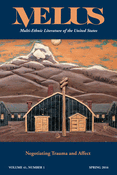 The journal College Literature has just published a review of Market Aesthetics in their April 2016 issue.
The journal College Literature has just published a review of Market Aesthetics in their April 2016 issue.
In the College Literature review, Maya Socolovsky asserts that “Machado Sáez makes a valuable and original contribution to the field of Caribbean diasporic literature with her superb analysis not only of the fiction itself but also of its global contexts, its ethics of writing production and reading strategies, and its paratexts […] The scope of the work is impressive, as is the insistent call that underlies all the readings, for us to be attentive to our ethical sensibilities and obligations as scholars and readers of Caribbean historical fiction” (472).






